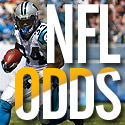A lesson in investing, NFL style
10/09/2002
Codding Home / Sports Channel / Bullz-Eye Home
The 1999 NFL draft produced some of today's elite players. Edgerrin James was selected fourth overall by the Colts, Ricky Williams fifth by the Saints, the Cardinals snagged David Boston with the eighth selection and, standing as one of the draft's best bargains, the Bears stole Marty Booker in the third round with the 78th pick. But in the weeks leading up to April 17, 1999, most of the focus wasn't centered on the young running backs, receivers and defensive linemen that would soon be signing their first NFL contracts.
Instead, everybody had their attention turned to one position: quarterback.
That draft class from 1999 was allegedly crammed with talented signal callers, a cast that starred, in order of appearance: Tim Couch, the boyish pocket-passer who threw for 4,250 yards with 36 TD and a 72% completion rate during his junior year at Kentucky; Donovan McNabb, the four-time All-Big East quarterback from Syracuse regarded by many as the best athlete in the draft; Akili Smith, the wild card of the group who showed tremendous promise and athleticism during his only season as Oregon's full-time starter; Daunte Culpepper, the 250-pound Mack truck from Central Florida who ran like a fullback and threw like an All Pro; and Cade McNown, the southpaw from UCLA who supposedly represented the most polished quarterback in the lot.
The big day rolled around and for the first time since 1971, a trio of quarterbacks was taken with the draft's first three picks. Couch was selected first overall by the Browns, McNabb went to the Eagles with the second pick and then, in a move they've lamented every day since, the Bengals took Smith with the third choice. Minnesota grabbed the hulking Culpepper at pick 11, followed by the Bears choosing McNown at #12.
Five quarterbacks, all considered blue-chip prospects, taken within the first dozen picks in the 1999 draft. Five teams banking their long-term success on five guys who obviously had never taken an NFL snap, instead having to base their decisions on individual workouts, interviews and miles upon miles of game film.
Prognosticators across the country felt obligated to compare this group to the legendary quarterback class of 1983. That year, the Patriots chose Tony Eason at #15 and the Jets took Ken O'Brien at #24, but the true jewels of the draft would be uncovered by the Colts, Bills and Dolphins. Baltimore used the first overall pick on Stanford's John Elway, 13 slots later Buffalo selected Jim Kelly from Miami and then, with the 27th pick, Miami turned to Pitt's Dan Marino.
Legendary quarterback class indeed. All three would post Hall-of-Fame numbers and all three, after Elway's trade to Denver, would play their entire careers with one team.
Still, no draft before or since 1999 has seen five quarterbacks chosen within the first 12 picks, an occurrence that sparked plenty of optimism for Couch, McNabb, Smith, Culpepper, McNown and their respective teams.
More than three full years later, though, most of that optimism has been replaced with regret as only one quarterback from that promising draft class, McNabb, has been a consistent winner.
McNabb's success is absolutely soaked with irony, though, considering Philly fans, daydreaming of tough four-yard runs in December from Heisman winner Ricky Williams, booed the selection of the former Syracuse star.
Nobody at the Vet is booing #5 these days.
McNabb is putting together another impressive season through the Eagles' first five games, currently owning the third-best QB rating in the NFC at 90.4 and his 11 touchdowns tie him with Brett Favre for the NFC lead. Last year he threw for more than 3,200 yards and 25 touchdowns and in 2000, his first full season as the Philly starter, McNabb played at an MVP-caliber level, throwing for 3,365 yards and 21 touchdowns while running for another 629 yards and six more scores.
Of course, I'm not simply talking about numbers here. The Eagles have gone 11-5 in each of the past two seasons, advancing to the second round of the playoffs in 2000 and then to the NFC Championship Game before falling to the Rams last year. This season, at 3-2, the Eagles are again the NFC East favorites and with the way McNabb and the defense have been playing, many consider Philly to be a legitimate Super Bowl contender... in 2002 and beyond.
Culpepper's pro career started out even more brilliantly than McNabb's. After spending the entire 1999 season with a clipboard in his hands, Culpepper went into week one of the 2000 campaign as Minnesota's starting quarterback despite having yet to register his first NFL attempt. By the end of the year, though, he'd thrown for nearly 4,000 yards and 33 touchdowns while adding 470 yards and seven touchdowns on the ground, helping the Vikings advance to the NFC Championship Game.
But that's just about where Culpepper's magical ride stalled.
The Vikings were kicked around by the Giants in that final playoff game of 2000, losing 41-0 in New York. After the season, running back Robert Smith stunningly retired and then the following summer, offensive lineman Korey Stringer died during training camp. The Vikings never recovered, going 5-11. Receivers Randy Moss and Chris Carter were at each other's throats all year, head coach Dennis Green was fired and then, in week 11, Culpepper suffered a season-ending knee injury, finishing with an 83.3 QB rating -- down from 2000's 98.0 -- and 13 interceptions versus just 14 touchdowns. At the end of the season, Carter opted out of his contract and then, unable to find a team to sign with, the 15-year veteran followed Robert Smith into retirement.
And this year? The Vikings are 0-4 and Culpepper owns a 65.1 QB rating, throwing five touchdowns and eight interceptions in those four losses. Even worse, the Central Florida product apparently isn't getting along with his star receiver, at least not on the field. So now the debate rages: Was Culpepper's 2000 season more a product of his supporting cast or his abilities as an NFL quarterback? It'd be unfair to say he succeeded two years ago only because of his offensive line and the presence of Smith, a 1000-yard rusher, in the backfield. After all, he's still got a great arm and when he's on the run, Culpepper is extremely tough to bring down, but 15 losses in Minnesota's last 20 games is quite a telling stat.
If a team's record is the most important factor in gauging a quarterback's relative success, then Tim Couch has been a complete flop in his three-plus years with Cleveland. Fourteen starts in his rookie season culminated in a 2-12 record; seven starts in an injury-shortened 2000 campaign ended with two wins and five losses; last year the Browns, with Couch behind center for a full 16 games, went 7-9; and in his three starts this season, Cleveland is 1-2.
That's 40 career starts and a 12-28 record. Not exactly the road to Canton, is it?
But let's be fair for a second. Couch came into a losing situation from the get-go, representing Cleveland's first pick as an expansion team. Last season, the Browns fielded the worst running game in football, averaging an NFL-worst 3.24 yards/carry, and in 2000 Cleveland running backs ripped off an underwhelming 3.23 yards/carry. This season, they're up to 3.8 but the Browns are still averaging just 82.2 rushing yards/game, a total that ties them with the Giants for 21st in football.
In other words, Couch hasn't exactly been surrounded by an All-Pro cast. This year the talent's been better but there's still no offensive line in Cleveland and rookie running back William Green has been worthless. Browns fans are getting restless, though, and with each win added to McNabb's growing total even more begin to question the Couch selection in 1999 and his future with the team. He's shown signs of finally "figuring it out," but he's still making too many mistakes and, in the end, the Browns simply aren't winning with Couch behind center. I've been one of his most loyal supporters and I'm certainly not ready to jump on the Kelly Holcomb backup bandwagon just yet, but if Couch doesn't start winning consistently he'll soon be saddled with that "bust" label that's pushed so many highly touted quarterbacks before him into permanent retirement.
That seems to be the path Smith and McNown are following. Smith started just four games during his rookie year; McNown six. Smith started 11 games in 2000; McNown nine. The QB rating for both during those 15 games was pathetic: 54.2 and 67.7, respectively.
These days, Smith can be found on the Cincinnati sidelines, working as the second- or third-string quarterback. Two weeks ago, in the midst of a winless start to the 2002 season, head coach Dick LeBeau handed his fourth-year quarterback a start against the Buccaneers; Smith responded with a 12-33, 117-yard performance with an interception returned for a touchdown. Since the start of the 2001 season, Smith's played just three games, starting two, and for his career the Oregon product's thrown 13 interceptions versus five touchdowns with a 46.6% completion rate.
But Smith's played in three more games than McNown the past two years. Following the 2000 season the Bears traded their top pick from a year earlier (much to the delight of the guys behind TradeCade.com) to the Dolphins and then, after not even taking the field with Miami, McNown again was dealt, this time to San Francisco for a future draft pick.
Likely not the 12th-overall selection originally wasted on the former UCLA star but, hey, at least the 'Phins got something, right?
That's more than I can say for the 49ers -- McNown's out for the year with a shoulder injury, marking the third-straight season his stat sheet has been completely barren.
Answer the phone, Cade. Retirement's calling -- apparently Ryan Leaf's looking for some company.
In 1999, five teams placed their franchises' success in the hands of five rookie quarterbacks. Three years later, the Eagles have emerged victorious but the juries remain deliberated in Minnesota and Cleveland. The Bengals have basically conceded their draft mistake while the Bears cut their losses long ago.
The moral? As we've discovered all too often, potential doesn't always breed production, no matter how much hype comes along for the ride. Philadelphia reached into that 1999 draft and pulled out a gem; Minnesota and Cleveland collected two unfinished products; Cincinnati and Chicago were swindled.
Five quarterbacks chosen within the first 12 picks of the draft and only one has panned out. And then, with the 131st overall selection, the 36th in the fourth round, the Green Bay Packers quietly chose an inconsistent fifth-year senior from Virginia named Aaron Brooks, a guy who didn't even rate in the top-10 among quarterbacks on many draft lists.
As you probably know, Brooks has since been traded to New Orleans and, just before the 2002 season started, he signed a six-year, $36-million extension. The Saints are now 4-1 and Brooks has thrown for 1,186 yards and 10 touchdowns.
Go figure.
In the Bullz-Eye
The New England Patriots. After starting the year 3-0, suddenly the champs find themselves at 3-2 heading into a game against the 4-1 Packers. A bye in week seven is followed with a home game against Denver before traveling to Buffalo, Chicago and Oakland the next three weeks. That spells trouble.
Questions/comments? Send
all e-mails to jcodding@bullz-eye.com.






